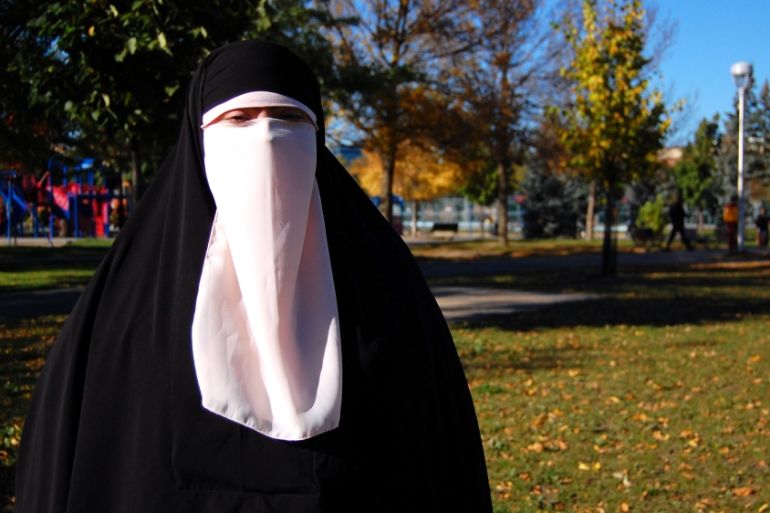Quebec court extends suspension of law banning face veils
Implementing Bill 62, passed last year, would cause ‘irreparable harm to Muslim women’, judge rules.

Montreal, Canada – A Quebec court has extended an injunction that suspends a law that would bar Muslim women in the Canadian province from receiving public services with their faces covered.
This is the second legal stay issued against a provision of Bill 62, a contentious law that the province says it needs to maintain state religious neutrality, but which critics say infringes on the rights of Muslim women.
Keep reading
list of 4 items‘Prejudice, Islamophobia’: Free speech fears as UK redefines extremism
Police investigate if killer targeted women in Sydney mall stabbings
Why Biden’s White House iftar unravelled amid Gaza war
Section 10 of the law, which the Quebec legislature passed last October, prohibits people from having their faces covered when giving or receiving public services in the province.
Civil liberty and Muslim advocacy groups filed a constitutional challenge to Bill 62, formally called the “Act to foster adherence to State religious neutrality”, shortly after it was approved.
They also demanded a court injunction to bar Section 10 from coming into effect.
A court issued a decision halting the provision’s implementation last December, but that stay was set to expire on July 1.
In a ruling handed down Thursday, Quebec Superior Court Justice Marc-Andre Blanchard extended the injunction, saying implementing Section 10 would cause “irreparable harm to Muslim women”.
“If the existing stay is not extended beyond July 1st, the fundamental rights and freedoms of women who cover their faces for religious reasons will be seriously infringed,” Blanchard wrote.
The injunction will be in effect until a ruling is issued in the pending legal case.
Sections of Bill 62 also appear to violate parts of the Canadian and Quebec charters that guarantee “freedom of conscience and religion”, Blanchard said.
He did not delve into the constitutional question, however, since it fell beyond his remit.
“There can be no doubt that there is a serious question to be decided at trial,” he wrote.
‘Common-sense rules’, province argues
Last November, the National Council of Canadian Muslims, the Canadian Civil Liberties Association and Warda Naili, a Muslim woman in Montreal who wears a full-face veil, filed a lawsuit against Bill 62.
They argued the law infringes on the rights of Muslim women who wear full face coverings and violates both the Canadian Charter of Rights and Freedoms and Quebec’s Charter of Human Rights and Freedoms.
About 200 Muslim women are believed to wear full face coverings in Quebec, with most based in and around Montreal, the province’s largest city.
“While the constitutional legal challenge of this law is yet to be completed, the significance of [Thursday’s] decision is not lost on Quebec Muslims, specifically those Muslim women [who] do veil their faces in accordance with their sincerely-held religious beliefs,” said Leila Nasr, an NCCM spokesperson.
Had the law gone into effect, Nasr told Al Jazeera in an email that “the most basic daily activities of these women – and, by extension, those of their children and other family members – would have been seriously and irreparably impacted”.
The province’s justice minister has previously defended the law as being “justified in the free and democratic society that is Quebec”.
The legislation is meant to help public service providers more easily identify people, the government has also argued.
“These are common-sense rules that will apply,” Justice Minister Stephanie Vallee previously said.
Quebec has also said it would allow exemptions to the law to be granted on the basis of religion, a process known as “religious accommodations”.
‘Significant confusion and ambiguity’
However, in his court decision, Blanchard said “significant confusion and ambiguity” persist over how these exemptions will be decided.
Last month, the provincial government unveiled its guidelines for requesting and approving the accommodations.
Under the rules, applicants must prove that they need to be accommodated due to Article 10 of the law, and they must be open to finding a reasonable solution.
The request must be “based on a sincere belief”, while the accommodation must be reasonable, allow the state to maintain religious neutrality and be in accordance with the concepts of equality and non-discrimination.
Public agencies would also need to appoint a specific person to deal with accommodation requests.
“Each request must be treated on a case-by-case basis,” Vallee said in a statement (French) when the guidelines were released. She said the rules were meant to serve as “a tool to guide [organisations] to make objective and well-informed decisions”.
In its current form, the law would force Muslim women to obtain approval “to do such basic things as ride the bus or metro, attend a healthcare facility, pick up a child from school, attend school or go to a museum”, Blanchard wrote in his ruling.
Catherine McKenzie, a lawyer at Montreal law firm IMK LLP who is representing the plaintiffs in the case, said the proposed process “impose[s] an additional burden” on Muslim women.
“They’d have to go through this arduous process that would require them to go to however many government agencies to do basic things that everybody else takes for granted,” she told Al Jazeera.
“I don’t think the guidelines are clear. I also don’t think the process is clear. There is no deadlines by which they have to give these [accommodation] decisions,” McKenzie said.
“There’s a lot of problems and we think the guidelines exacerbate the issue.”
A court date for the constitutional challenge has not been set yet, McKenzie added.